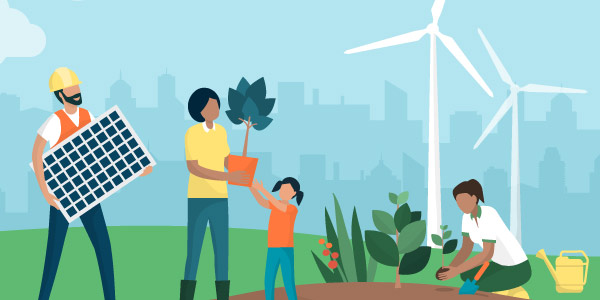Last updated on September 29, 2021
Welcome to the first edition of Dallas County Community College District’s (DCCCD) sustainability newsletter. The newsletter will keep you updated on the sustainability projects and events produced by DCCCD. You are receiving this because you have either attended one of our sustainability events or you signed up to get sustainability-related news from us.
Subscribe to receive the latest Sustainable DCCCD news.
DCCCD Preps for Climate Action Planning
By Georgeann Elliott Moss
DCCCD is undergoing several exciting changes. Last year, the citizens of Dallas County passed a $1 billion bond program for DCCCD for:
- Industry-aligned workforce projects and programs ($235 million);
- Student-related instruction and success programs ($332 million); and the
- Dallas Education and Innovation Hub ($535 million)
Planning for the initial projects has begun.
In February, DCCCD’s Board of Trustees approved a plan to restructure the seven independently accredited colleges into a single college with seven main campuses. Our new name will be Dallas College, and we will have seven main campuses (Brookhaven, Cedar Valley, Eastfield, El Centro, Mountain View, North Lake and Richland) and multiple satellite campuses. This structural change will make it easier for our degree-seeking students who take courses at more than one campus to graduate.
This structural change will also make climate action planning easier and more effective.
Most of DCCCD’s colleges have already created Climate Action Plans for their location. These existing plans will be aggregated under a single Dallas College plan in 2021.
For the remainder of 2020, we will be laying the groundwork for the new DCCCD Climate Action Plan. Each location will complete a Greenhouse Gas (GHG) inventory and provide information for the first-ever DCCCD Sustainability Tracking and Rating System (STARS) report, which is a transparent, self-reporting framework for colleges and universities to measure their sustainability performance. It was created by the member institutions of the Association for the Advancement of Sustainability in Higher Education (AASHE).
DCCCD will analyze the data we collect, then prioritize the greenhouse gas-reducing strategies and programs we will implement to reach carbon neutrality.
DCCCD’s plan will align with the City of Dallas Comprehensive Environmental and Climate Action Plan and with the climate action plans of the other 30 towns and cities in Dallas County.
Building Standards and Aspirations
DCCCD’s Facilities Department is in the process of developing building standards that all new construction and renovation projects must meet. The document will include energy and water efficiency standards, resource conservation and many other sustainability-related standards.
We have also created a document called the Aspirational High-Performance Building Guidelines, which identify the high-level, aspirational goals for all new construction and renovation projects. These are lofty goals, but we are confident that the market is moving in that direction and that these new technologies and building methods will soon be the norm. When that happens, we’ll add them to the Buildings Standards, which will be updated periodically.
Contact Us
Do you have partnership ideas? Sustainability class suggestions? Questions you’d like answered about DCCCD/Dallas College’s sustainability program? Please contact me at gemoss@dcccd.edu
Georgeann Moss
Executive Administrator
Sustainability Outreach and Initiatives
Register for Next Sustainable U Pop-Up Event
“Sustainable Landscapes and Public Green Spaces”
- 6-8 p.m., Tuesday, March 24, 2020
- Brookhaven College
- X Building, Room X-1091
Join EarthX and Brookhaven College for an evening to explore the idea, “What makes an urban landscape sustainable?” Learn about local and regional efforts from leaders across North Texas working to create more public green spaces that support a more vibrant, live-work-play community for all ages and cultures. According to the City Parks Alliance, larger parks and greenbelt corridors contribute to increased property values and to overall urban health, promoting physical activity, recreation, relaxation, heat and flood mitigation. Enhancing the urban landscape with green infrastructure also helps to filter pollution, resulting in improved air quality and water quality. Brookhaven College and Earth X hope you will join us for this educational event on the social, economic and environmental benefits of sustainable landscapes in our community and region.
Tip: The Good News About the Climate Crisis
Bad news: Our health, our economy and our climate are being damaged by pollution from fossil fuels and greenhouse gases.
Good news: All the tools, knowledge and technology we need to stop and reverse the damage are available today. To see a summary and ranking of those solutions, visit: Project Drawdown.
Best news: When we work together to achieve “drawdown,” the point when greenhouse gas levels in the atmosphere start to decline, there will be many new careers and economic opportunities for the people and organizations willing to embrace change.
Are you up for the challenge?
Sustainable UN Goal 1: No Poverty
Addressing poverty and environmental issues is critical for accomplishing sustainable success. Why? According to the U.N., 70% of the world’s poor men and women draw upon natural resources for most of their livelihoods. Economic growth must be inclusive to provide sustainable jobs and promote equality. After all, the environment’s natural resources are the “natural capital” of the poor.
